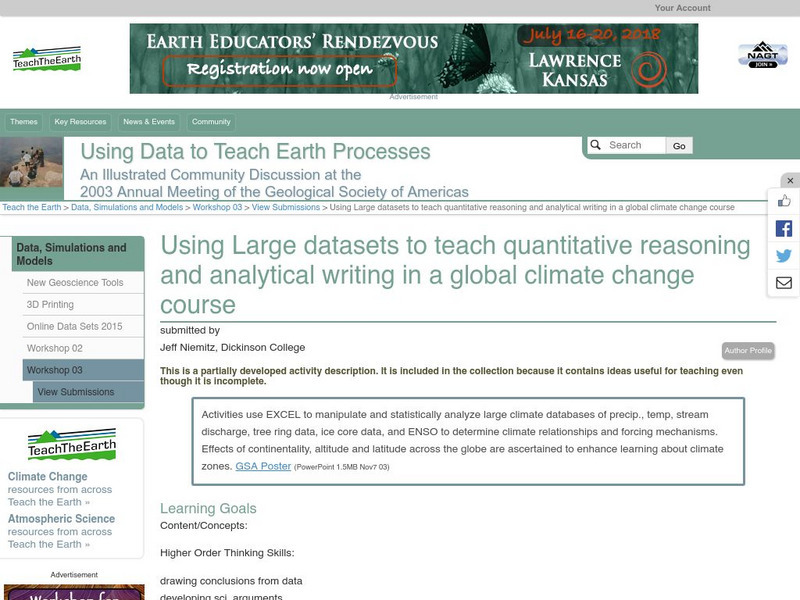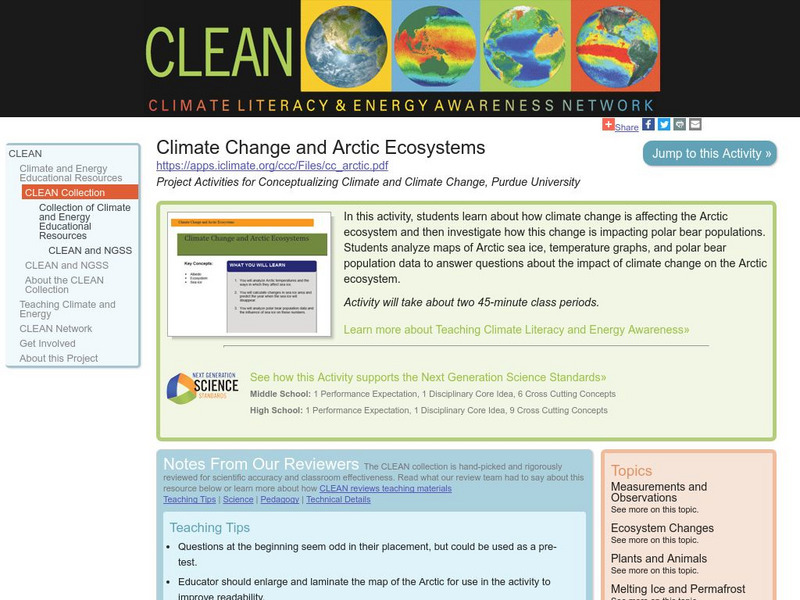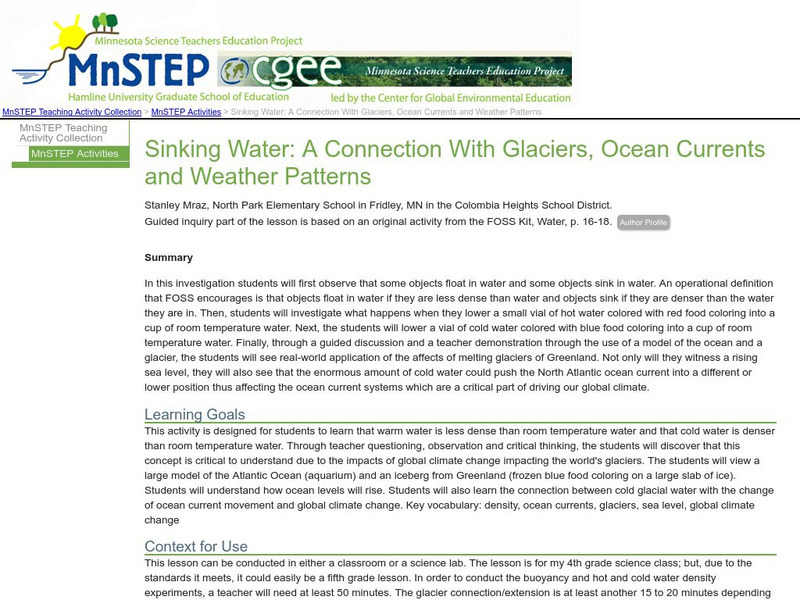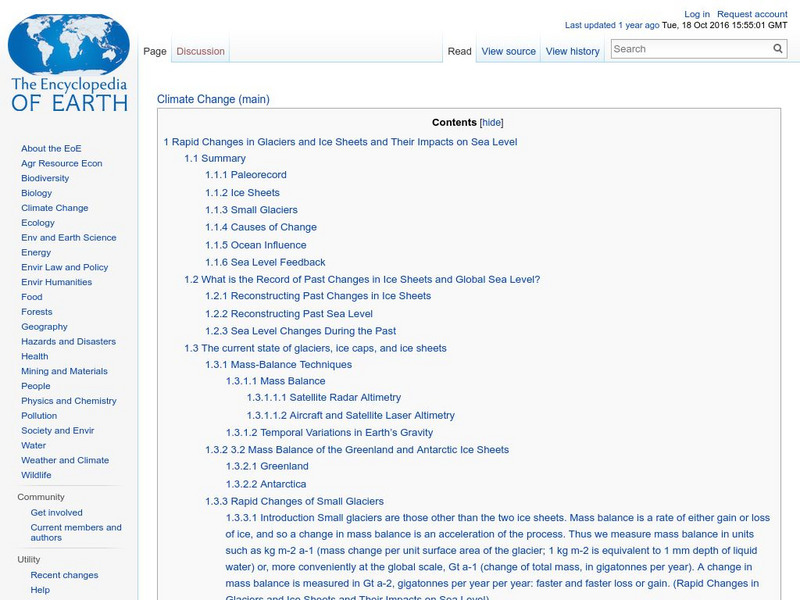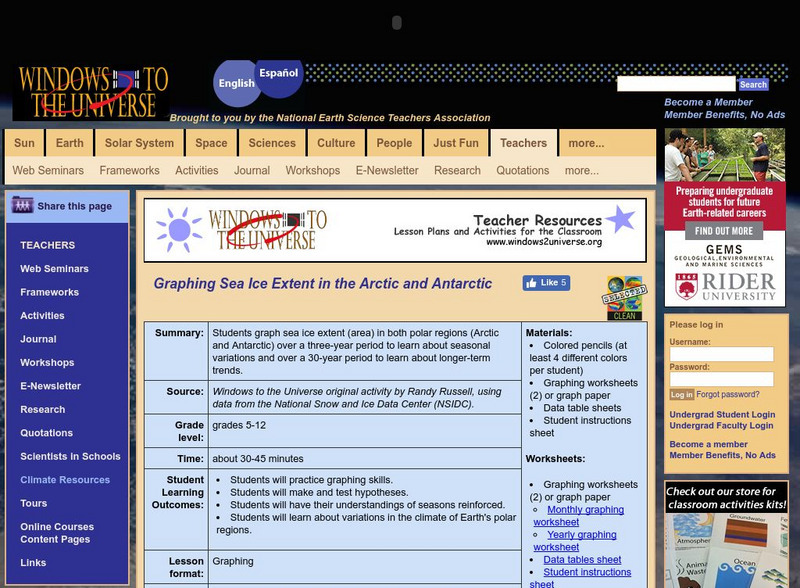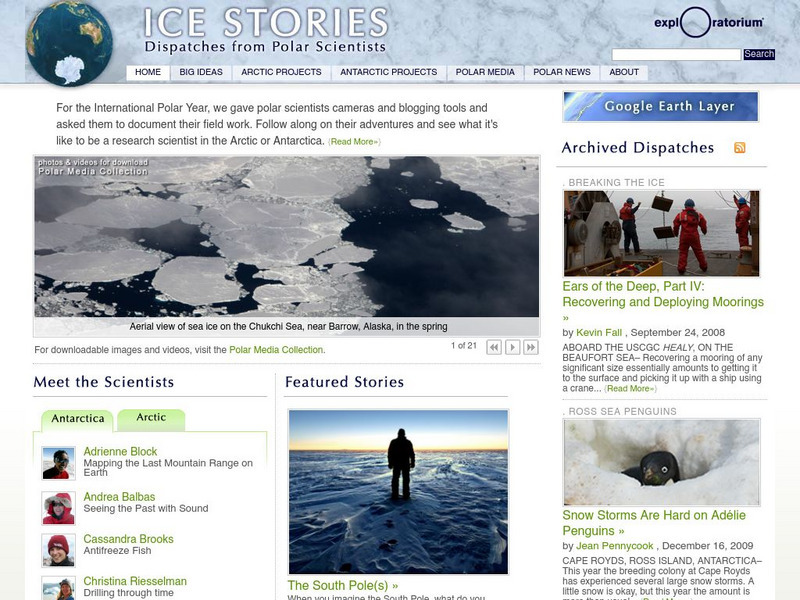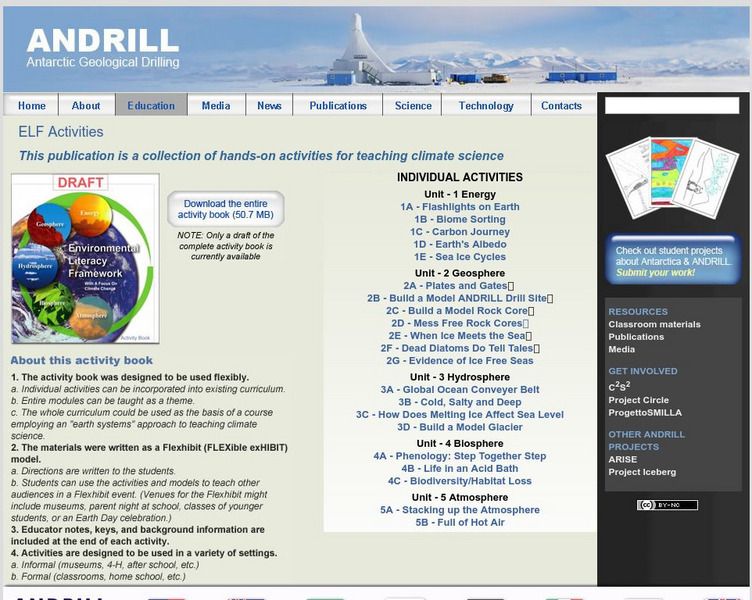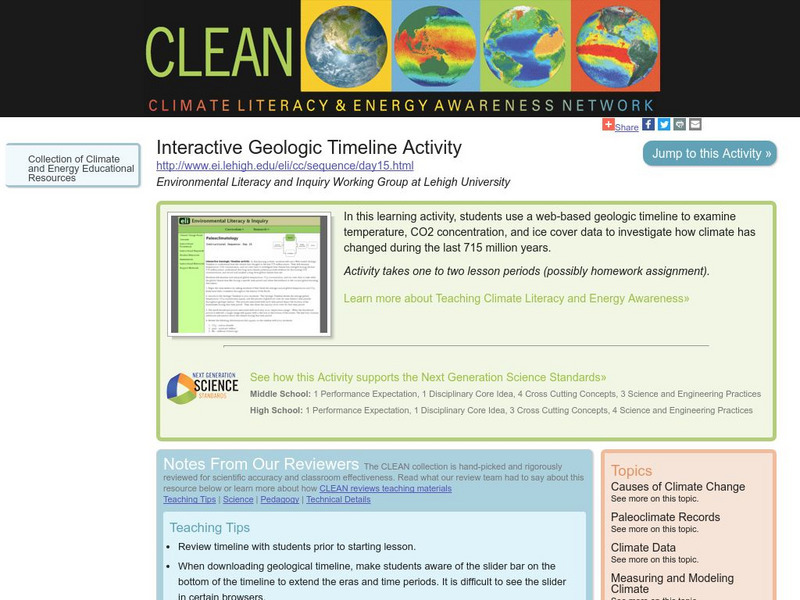Science Education Resource Center at Carleton College
Serc: Quantitative Reasoning and Analytical Writing in a Global Climate Change
In this lesson learners use Microsoft Excel to manipulate and statistically analyze large climate databases of precipitation., temperature, stream discharge, tree ring data, ice core data, and ENSO to determine climate relationships and...
Center for Educational Technologies
Cet: Exploring the Environment: Ice Caps and Sea Levels
Students have just completed climate science fieldwork studying Earth's ice caps and sea levels. Analyze the data to present a report to the U.S. Panel on Global Climate Change.
Climate Literacy
Clean: Climate Change and Arctic Ecosystems
Learners learn about how climate change is affecting the Arctic ecosystem, and then investigate how this change is impacting polar bear populations. Students analyze maps of Arctic sea ice, temperature graphs, and polar bear population...
BBC
Bbc: News: Guide to Climate Change
The BBC offers an interactive guide to climate change, including a sliding scale depicting climate change from 1885 to 2099, animation which explores how the greenhouse effect works, and detailed diagrams exploring the carbon cycle, the...
University of Wisconsin
Uw: Probabilities, Uncertainties and Units Used to Quantify Climate Change
This resource engages learners in using scientific data to analyze a 150-year dataset from Lake Mendota in Madison Wisconsin reflecting seasonal ice cover.
Climate Literacy
Clean: How Does Melting Ice Affect Sea Level?
Students investigate how sea levels might rise when ice sheets and ice caps melt by constructing a pair of models and seeing the effects of ice melt in two different situations.
National Earth Science Teachers Association
Windows to the Universe: Effects of Climate Change Today
Learn some effects of climate change that are being caused by warmer temperatures. Links to related material.
Science Education Resource Center at Carleton College
Serc: Mn Step: Sinking Water: Glaciers, Ocean Currents and Weather Patterns
A lesson where students learn how warm water is less dense than cold water, and what this means for global climate change as ice from the polar regions melts. Students will do experiments in buoyancy and water density when hot or cold,...
PBS
Pbs Learning Media: Melting Ice
A mulit-media lesson where students explore the role that ice plays on Earth, the factors causing it to melt, and the local and global consequences of melting ice.
PBS
Nova: Extreme Ice
Students study how scientists monitor changes in Earth's glaciers, ice caps, and ice sheets. They investigate about glacier locations, glacial movement, and impacts of climate change on glaciers depending on the depth of research.
Encyclopedia of Earth
Encyclopedia of Earth: Rapid Changes in Glaciers and Ice Sheets
The world's glaciers and ice sheets are melting according to this extensive report. It makes recommendations on how to monitor this situation, explains what we know about the past when there was much less ice in the world, describes what...
BBC
Bbc News: An Animated Journey Through the Earth's Climate History
A narrated journey through the last 800,000 years of the Earth's climate, accompanied by images and graphs. A text-only version is also available. (Published 3 Dec. 2009)
American Geosciences Institute
American Geosciences Institute: Earth Science Week: Sea and Ice Salinity
Students investigate the effects of salinity on the formation of sea ice, and whether salt water freezes more quickly or more slowly than fresh water.
Smithsonian Institution
Smithsonian Environmental Research Center: Arctic: A Friend Acting Strangely
Discover the devastating effects of climate change on an Inuit Arctic community in northern Canada. The melting sea ice caused by global warning has started a chain reaction of many changes in the culture and survivability in the Arctic...
NASA
Nasa: Climate Time Machine
Take a trip in a "time machine" to see a series of pictures that show the how the climate of Earth has been changing. The indicators shown are: sea ice, sea level, carbon dioxide, and global temperature.
NPR: National Public Radio
Npr: Greenland: Ice on the Move
NPR offers a photographic slide show on the status of Greenland's ice glaciers as they start to melt and the consequences of the melting for the future.
Climate Literacy
Clean: March of the Polar Bears: Global Change, Sea Ice, and Wildlife Migration
Students use NASA satellite data to study temperature and snow-ice coverage in the South Beaufort Sea, Alaska. With the data, they investigate global change, sea ice changes, and polar bear migration.
Climate Literacy
Clean: Impacts of Topography on Sea Level Change
Young scholars use web-based animations to explore the impacts of ice melt, specifically changes to sea level. They also use topographic maps to examine the relationship between topography and sea level change by mapping changing...
National Earth Science Teachers Association
Windows to the Universe: Graphing the Extent of Sea Ice in Arctic and Antarctic
Students graph sea ice extent in both polar regions over a three-year period to learn about seasonal variations, and over a 30-year period to learn about longer-term trends.
Exploratorium
Exploratorium: Ice Stories: Dispatches From Polar Scientists
During the International Polar Year, scientists descended on the Arctic and the Antarctic in droves. While there, they documented their experiences and research work. That rich database of information, covering November 2007 to October...
Other
Antarctic Geological Drilling: Environmental Literacy Framework Activities
An impressive collection of lessons on climate science and climate change. The entire book can be downloaded. As well, each lesson has its own page with some combination of background information, PowerPoints, images, maps, glossaries,...
Climate Literacy
Clean: Interactive Geologic Timeline Activity
In this learning activity, students use a web-based geologic timeline to examine temperature, CO2 concentration, and ice cover data to investigate how climate has changed during the last 715 million years. Students will gain an...
NOAA
Noaa: Arctic Theme Page
Information on the Arctic for students, teachers, and other interested groups includes changes in the ecosystem and climate.
